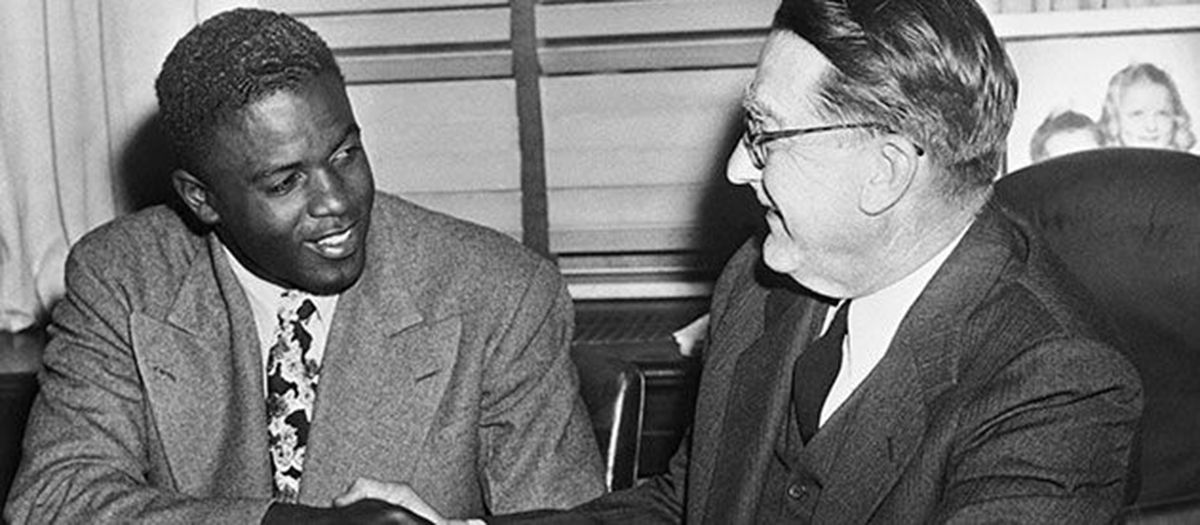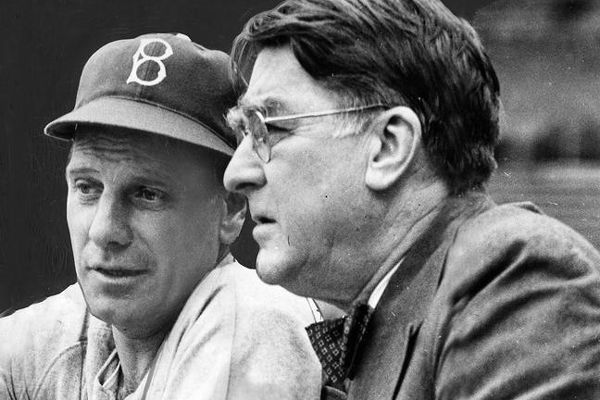In a career that spanned multiple generations and multiple revolutionary changes in baseball, Branch Rickey (Ohio Wesleyan University, 1904) was always looking to innovate.
Rickey started his professional playing career while studying at Ohio Wesleyan University. He spent two seasons (1906–07) in the American League as a catcher and graduated from the University of Michigan Law School in 1911.
After serving as field manager of the American League St. Louis Browns (1913–15), he began a long association with the National League St. Louis Cardinals—as club president (1917–19), field manager (1919–25) and general manager (1925–42).

"Some day I'm going to have to stand before God, and if he asks me why I didn't let that [Jackie] Robinson fellow play ball, I don't think saying 'because of the color of his skin' would be a good enough answer." - Branch Rickey
Rickey was dismayed at the Cardinals’ inability to bid successfully for promising minor league players. As a result, he persuaded club owner Sam Breadon to buy stock in the Houston (Texas) and Fort Smith (Arkansas) minor league teams so that St. Louis would have the first choice of their players.
The Cardinals won nine league championships with players signed during Rickey’s tenure. He then left the Cardinals to become president and general manager of the Brooklyn Dodgers of the National League (1943–50).
The great Brooklyn Dodgers dynasty was born out of the genius of Branch Rickey. And on August 13, 1945, Rickey—already the Dodgers team president—assumed control of the team when he and associates Walter O’Malley and John Smith acquired a 50-percent interest in the Ebbets estate, a reported $750,000.

After the transaction, Rickey, O’Malley and Smith each owned 25 percent of the club. Rickey, acting as his own general manager, immediately began restocking a Brooklyn team that had won the National League pennant in 1941 but had lost manpower due to World War II.
Rickey’s most memorable act with the Dodgers involved signing Jackie Robinson, breaking baseball’s color barrier, which had been an unwritten rule since the 1880s.
In early 1945, Rickey was anticipating the integration of Black players into Major League Baseball. Rickey, along with Gus Greenlee, the owner of the original Pittsburgh Crawfords, created the United States League (USL) to scout Black players specifically to break the color line.
Around this time, Rickey held tryouts for Black players, under the cover story of forming a new team in the USL called the “Brooklyn Brown Dodgers.” The Dodgers were, in secret, looking for the right man to break the color line.
Rickey chose a college-educated man who would be 27 before playing even one game in the white minor leagues for his African American torchbearer. He selected Jackie Robinson because he was from California. Robinson had played in California’s milder racial climate most of his life on integrated athletic teams. Rickey encouraged him to marry his fiancée, a move he felt always helped a ballplayer’s career. Robinson went on to justify Rickey’s gamble in every way and cement a lifelong relationship between the two men.
Rickey’s steadfast opposition to baseball’s color barrier would forever identify him as one of the game’s great pioneers. He signed Negro League star Jackie Robinson to a minor league contract in 1945 and paved the way for Robinson’s major league debut on April 15, 1947. Anticipating the harsh treatment that Robinson would receive from fans and opposing players, Rickey told Robinson he was looking for a man who “had guts enough not to fight back.”
Robinson broke the baseball color line when he started at first base for the Brooklyn Dodgers on April 15, 1947. When the Dodgers signed Robinson, they heralded the end of racial segregation in professional baseball that had relegated Black players to the Negro leagues since the 1880s. Robinson was inducted into the Baseball Hall of Fame in 1962.
Rickey served three more years in the Dodgers’ front office before ending his career with the Pittsburgh Pirates and a brief return stint with the Cardinals. He also served as the Continental League president, which never made it to the field but spurred the first round of big league expansion in 1961 and 1962.
Rickey passed away on December 9, 1965, and was elected to the Hall of Fame in 1967. Δ
